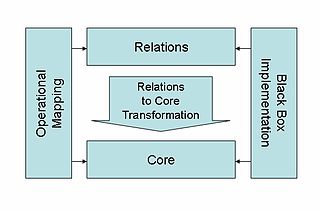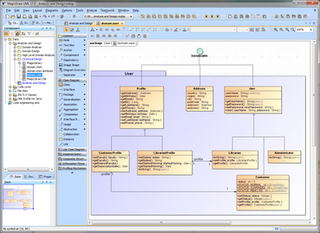Related Research Articles
The XML Metadata Interchange (XMI) is an Object Management Group (OMG) standard for exchanging metadata information via Extensible Markup Language (XML).

The Meta-Object Facility (MOF) is an Object Management Group (OMG) standard for model-driven engineering. Its purpose is to provide a type system for entities in the CORBA architecture and a set of interfaces through which those types can be created and manipulated. MOF may be used for domain-driven software design and object-oriented modelling.
A platform-independent model (PIM) in software engineering is a model of a software system or business system that is independent of the specific technological platform used to implement it.
A platform-specific model is a model of a software or business system that is linked to a specific technological platform. Platform-specific models are indispensable for the actual implementation of a system.
Model Driven Architecture (MDA) is a software design approach for the development of software systems. It provides a set of guidelines for the structuring of specifications, which are expressed as models. Model Driven Architecture is a kind of domain engineering, and supports model-driven engineering of software systems. It was launched by the Object Management Group (OMG) in 2001.
The Object Constraint Language (OCL) is a declarative language describing rules applying to Unified Modeling Language (UML) models developed at IBM and is now part of the UML standard. Initially, OCL was merely a formal specification language extension for UML. OCL may now be used with any Meta-Object Facility (MOF) Object Management Group (OMG) meta-model, including UML. The Object Constraint Language is a precise text language that provides constraint and object query expressions on any MOF model or meta-model that cannot otherwise be expressed by diagrammatic notation. OCL is a key component of the new OMG standard recommendation for transforming models, the Queries/Views/Transformations (QVT) specification.
The common warehouse metamodel (CWM) defines a specification for modeling metadata for relational, non-relational, multi-dimensional, and most other objects found in a data warehousing environment. The specification is released and owned by the Object Management Group, which also claims a trademark in the use of "CWM".

A metamodel is a model of a model, and metamodeling is the process of generating such metamodels. Thus metamodeling or meta-modeling is the analysis, construction and development of the frames, rules, constraints, models and theories applicable and useful for modeling a predefined class of problems. As its name implies, this concept applies the notions of meta- and modeling in software engineering and systems engineering. Metamodels are of many types and have diverse applications.
Domain-specific modeling (DSM) is a software engineering methodology for designing and developing systems, such as computer software. It involves systematic use of a domain-specific language to represent the various facets of a system.
Metadata publishing is the process of making metadata data elements available to external users, both people and machines using a formal review process and a commitment to change control processes.
Model-driven engineering (MDE) is a software development methodology that focuses on creating and exploiting domain models, which are conceptual models of all the topics related to a specific problem. Hence, it highlights and aims at abstract representations of the knowledge and activities that govern a particular application domain, rather than the computing concepts.

ATL is a model transformation language and toolkit developed and maintained by OBEO and AtlanMod. It was initiated by the AtlanMod team. In the field of Model-Driven Engineering (MDE), ATL provides ways to produce a set of target models from a set of source models.

QVT (Query/View/Transformation) is a standard set of languages for model transformation defined by the Object Management Group.

MagicDraw is a proprietary visual UML, SysML, BPMN, and UPDM modeling tool with team collaboration support.

Eclipse Modeling Framework (EMF) is an Eclipse-based modeling framework and code generation facility for building tools and other applications based on a structured data model.
Knowledge Discovery Metamodel (KDM) is a publicly available specification from the Object Management Group (OMG). KDM is a common intermediate representation for existing software systems and their operating environments, that defines common metadata required for deep semantic integration of Application Lifecycle Management tools. KDM was designed as the OMG's foundation for software modernization, IT portfolio management and software assurance. KDM uses OMG's Meta-Object Facility to define an XMI interchange format between tools that work with existing software as well as an abstract interface (API) for the next-generation assurance and modernization tools. KDM standardizes existing approaches to knowledge discovery in software engineering artifacts, also known as software mining.
The Ontology Definition MetaModel (ODM) is an Object Management Group (OMG) specification to make the concepts of Model-Driven Architecture applicable to the engineering of ontologies. Hence, it links Common Logic (CL), the Web Ontology Language (OWL), and the Resource Description Framework (RDF).
Acceleo is an open-source code generator from the Eclipse Foundation that allows people to use a model-driven approach to building applications. It is an implementation of the "MOFM2T" standard, from the Object Management Group (OMG), for performing model-to-text transformation.
A language workbench is a tool or set of tools that enables software development in the language-oriented programming software development paradigm. A language workbench will typically include tools to support the definition, reuse and composition of domain-specific languages together with their integrated development environment. Language workbenches were introduced and popularized by Martin Fowler in 2005.
References
This article includes a list of references, related reading, or external links, but its sources remain unclear because it lacks inline citations .(April 2009) |
- KM3: a DSL for Metamodel Specification Jouault, F, and Bézivin, J (2006). In: Proceedings of 8th IFIP International Conference on Formal Methods for Open Object-Based Distributed Systems, LNCS 4037, Bologna, Italy, pages 171-185.
- ADT Download
- Eclipse GMT site
- softwarefactories.com article
- Softmetaware.com article
- uio.no article
- softmetaware.com article
- trese.cs.utwente.nl présentation
- bis.uni-leipzig.de présentation